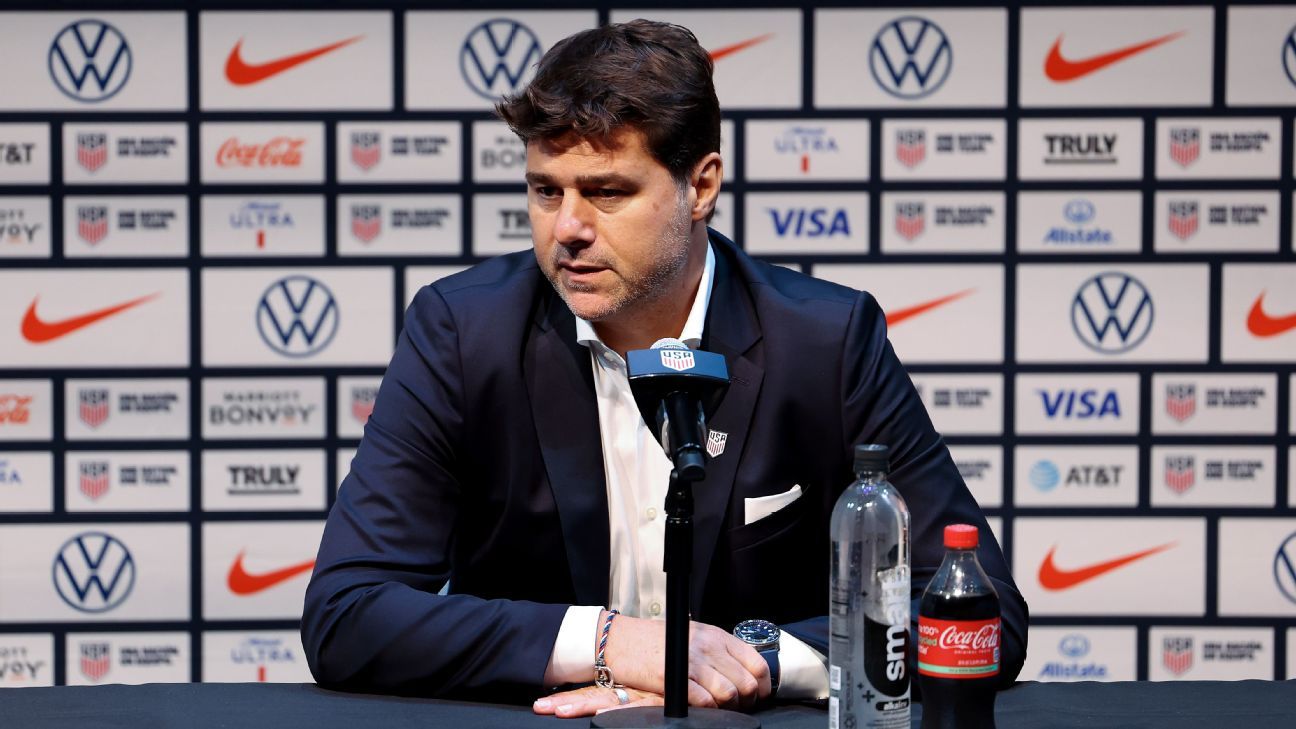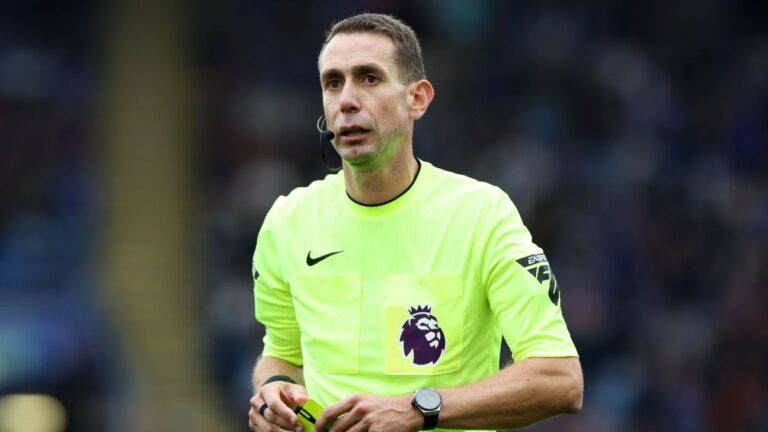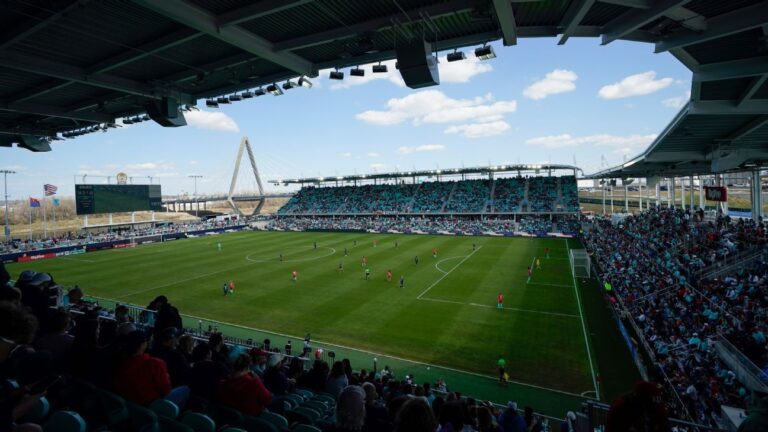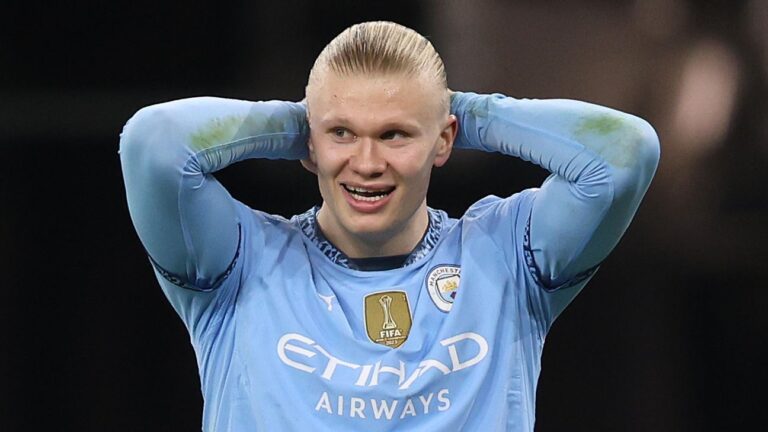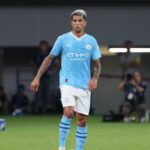-
Jeff Carlisle, U.S. soccer correspondentSep 13, 2024, 05:16 PM ET
- Jeff Carlisle covers MLS and the U.S. national team for ESPN FC.
NEW YORK — Amid the smiles and backslapping that took place during Mauricio Pochettino’s unveiling as the new U.S. men’s national team manager Friday, there was one, more sobering undercurrent.
Pochettino has a lot of work to do.
The group stage exit at this summer’s Copa América, and even some matches prior to that tournament, showed that the USMNT has regressed since the 2022 World Cup. The recently concluded September international window, which saw the U.S. beaten on home soil by Canada for the first time in 67 years and then tie New Zealand 1-1, reinforced that feeling.
Granted, taking over a struggling team is usually how coaches get hired in the first place. The Sir Alex Ferguson, leave-on-your-own-terms type of exit is rare. Usually, the new manager comes in because a course correction is badly needed, and that is obviously the case here.
So what, then, are Pochettino’s priorities as he begins to dig into the job? At Friday’s news conference, the Argentine seemed reluctant to get into many specifics, but he dropped enough breadcrumbs to hint at how he’ll proceed.
First, a bit of healing needs to take place. For Pochettino, the results of last week weren’t surprising. The pain of the Copa América performances was still too fresh. Getting over that means getting to know the players and finding ways to maximize their strengths and minimize their weaknesses. They need to believe in themselves again.
It also means connecting with them beyond just tactics and skill levels. Expect Pochettino to spend a lot of time visiting with players over the next month, pumping them up and reminding them of their talent.
Editor’s Picks
2 Related
“The player needs to feel that you care,” Pochettino said. “When the player feels that you care, you can get the best of them.”
He added, “We are going to work and to create the right pattern to follow, to get the confidence, to recover the confidence and start to perform together. But, of course, I think it’s a very good generation of players.”
That process will also require the players earning the confidence of the new coaching staff. More than once, Pochettino spoke of the need to not just “play” for a national team but to “compete” for it as well. That has been an issue during the summer, leading some players to conclude that a culture shift was needed.
While there is a sense that the onus for this falls on the players, the coach sets standards. Pochettino will need to be firm in explaining what those are and then enforcing them. Doling out — or withdrawing — playing time is the ultimate card he can play.
He will also need to sort out what the team’s style of play will be. In the past, he has preferred to have his teams press aggressively and then strike quickly. But he also wants his squads to be able to play out of the back when the situation calls for it, as having multiple styles in the tactical bag is a staple of good teams. That latter trait is something with which he’ll need to tread carefully, especially given the frailty displayed by the back line over the summer.
Pochettino seems to realize that it won’t be only the players who will have to adapt. He and his staff will do some adjusting as well, and together they’ll need to produce a cohesive style.
“I said always we need to see the player, feel the player, see all the characteristics,” he said. “But I think we’re very flexible.” He added that he’ll need “to create this platform that when they come, the players arrive to the national team, they need to know exactly what we need to do, how we need to compete, how we need to behave like a team. And … the talent is there. It’s only to create the best platform for them to express yourself.”
play
1:06
Pochettino promises the ‘door is open’ to every U.S. player
Mauricio Pochettino says there will be no bias toward European-based players when it comes to his USMNT squad selection.
There is the question of whether Pochettino will have enough time to implement his approach. There are only nine international windows left, including the pre-World Cup period. But Pochettino doesn’t want the players using a lack of training time as an excuse if they struggle to adapt. From what he has seen, the current group of players is smart enough and has the capacity to take on new playing concepts quickly.
“I see the players are so intelligent and so talented and they can, I think, play in a different way,” he said. “And for sure I think we have time. We have time and we need to really believe and think in big things. We need to believe that we can win, that we can win the World Cup. Because if not, it’s going to be so difficult to show me, and we want players that arrive in day one in the training camp and think big and that is the only way to create this philosophy or this idea altogether to perform and to really to put your talent on the service of the team.”
That isn’t to say that there won’t be any hiccups or setbacks. But Pochettino, in this moment, is thinking of what’s possible, for both players and staff.
“That is going to be a massive challenge,” he said. “We are going to be very clinical and try to transmit all the information in the same time. Players, it’s difficult to be concentrated, focused and more in this time, but I think we need to be clever enough in the way we’re approaching things to get the best from them.”
Though Pochettino was hired with an eye on the World Cup, in the short-term there are other competitions to think about. There is the Concacaf Nations League in November and March. Then comes next summer’s Concacaf Gold Cup, which will have a more familiar tournament setting with a group stage and knockout rounds.
Granted, they won’t involve a World Cup competition level, but given how the U.S. has struggled against Concacaf foes lately, it’s not an event at which the team can turn up its nose. Pochettino seems willing to take things step-by-step.
“For me, the priority now is improve, improve and improve and provide the team the best tools for the talent to perform as soon as possible,” he said.
After a brutal summer, improvement would be a welcome development.
